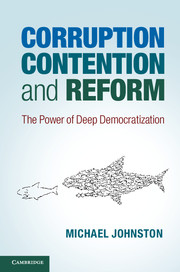Book contents
- Frontmatter
- Dedication
- Contents
- List of Figures
- List of Tables
- Preface
- Acknowledgments
- 1 Reform in an imperfect world
- 2 “Deep democratization” and the control of corruption
- 3 First, do no harm – then, build trust: reform in fragile and post-conflict societies
- 4 Official Moguls: power, protection . . . and profits
- 5 Oligarchs and Clans: high stakes and insecurity
- 6 Elite Cartels: hanging on with a little help from my friends
- 7 Influence Market corruption: wealth and power versus justice
- 8 Staying power: building and sustaining citizen engagement
- Appendix Recognizing the syndromes of corruption
- References
- Index
5 - Oligarchs and Clans: high stakes and insecurity
Published online by Cambridge University Press: 05 June 2014
- Frontmatter
- Dedication
- Contents
- List of Figures
- List of Tables
- Preface
- Acknowledgments
- 1 Reform in an imperfect world
- 2 “Deep democratization” and the control of corruption
- 3 First, do no harm – then, build trust: reform in fragile and post-conflict societies
- 4 Official Moguls: power, protection . . . and profits
- 5 Oligarchs and Clans: high stakes and insecurity
- 6 Elite Cartels: hanging on with a little help from my friends
- 7 Influence Market corruption: wealth and power versus justice
- 8 Staying power: building and sustaining citizen engagement
- Appendix Recognizing the syndromes of corruption
- References
- Index
Summary
If you know how rich you are, you are not rich. But me, I am not aware of the extent of my wealth. That’s how rich we are.
– Imelda MarcosWe will get to the truth. That’s what we’re all asking for.
– Corazon AquinoIntroduction: there for the taking
Oligarch-and-Clan corruption generates some of the most spectacular corruption stories we are likely to see. As a contentious, sometimes violent scramble for high stakes in a setting of very weak official institutions, it poses difficult challenges and great risks for reformers. Opportunities for political and economic gain abound, while the institutions on which many corruption controls depend – courts, law enforcement, the bureaucracy, political parties, civil societies, and levels of trust – are overmatched by powerful factions exploiting government, society, and the economy. The state usually has little autonomy with respect to oligarchs and their followings, and often little public credibility. Taxes are not reliably collected, revenues from natural resources are likely to be squandered or stolen, and public services are chronically short of resources. Even where civil society does exist, reform efforts by citizens are hobbled by repression and potential violence – not to mention the poverty and desperation that corruption helps perpetuate. Can anything be done to check this disruptive and dangerous form of corruption?
- Type
- Chapter
- Information
- Corruption, Contention, and ReformThe Power of Deep Democratization, pp. 119 - 150Publisher: Cambridge University PressPrint publication year: 2013



